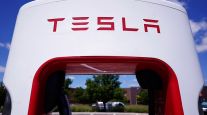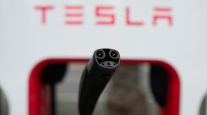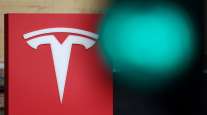Tesla CEO Elon Musk Is Getting Last Laugh on Wall Street
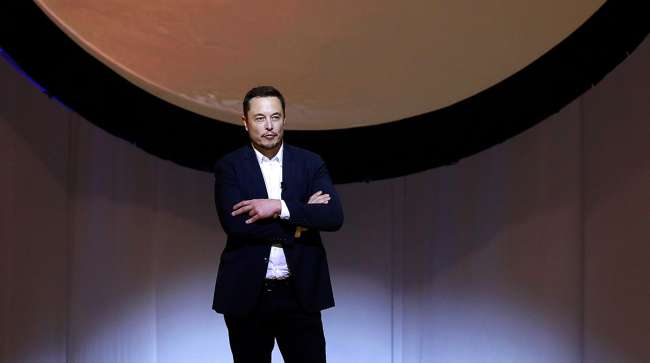
It was only a few months ago that Wall Street was bashing Elon Musk’s Tesla Inc. One analyst called the stock “no longer investable,” citing Musk’s erratic behavior in tweets and taunts. A short seller bet on a dramatic drop, saying it’s “more and more apparent that Tesla is having difficulties paying their bills.”
But an unexpected thing happened along the way: The company found its footing as an electric-car manufacturer, an achievement masked by Musk’s bluster. Its stunning third-quarter profit picture, boosted by its ability to ramp up production of Model 3 sedans, surprised naysayers and marked the beginning of a turn in market sentiment.
Tesla’s stock is, somewhat improbably, right back near the highs it reached on the day of that infamous “funding secured” tweet that caused a furious rally before landing Musk in trouble with the Securities and Exchange Commission`. And so after a year of stomach-churning swings that saw the stock post half a dozen rallies or sell-offs of 20% or more, it is up nearly 18%. Not bad when you consider that the S&P 500 is down 1.4 on the year.
All of this, of course, easily could shift again at any moment, given Musk’s penchant for impolitic remarks and the many operational challenges. But for now at least, Wall Street is bullish once again, expecting Tesla to be profitable and have positive free cash flow in the fourth quarter — accomplishments that would show the company finally has figured out how to produce cars at a stable pace and make money while doing it.
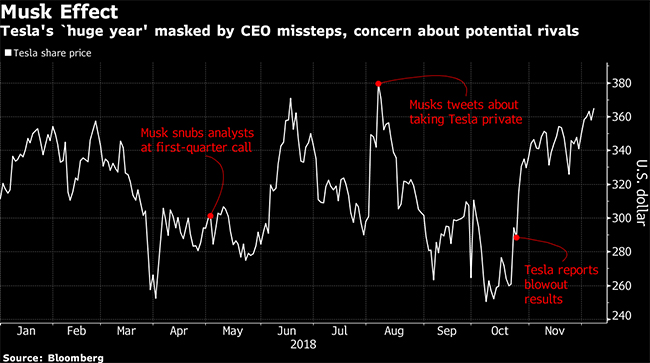
Bloomberg News
“Was the third quarter a fluke? Time will tell,” Roth Capital Partners analyst Craig Irwin said. “But the reality is that when you produce 50,000 cars a quarter, that is a big milestone, and you can see these guys are here for the long run. Tesla is squarely on its own two feet now, and learning and well-prepared to keep learning.”
Tesla’s stock always has been priced for perfection, and Musk’s Twitter habits weren’t the only roadblocks that investors faced in 2018. As it frantically tried to boost production of the Model 3, Tesla was burning cash at a rapid pace — as much as $8,000 a minute as it entered the year, according to Bloomberg calculations. Musk acknowledged how dire the problem was in an interview last month, saying the company’s earlier cash bleed had left it just a couple of months away from collapse.
Bond Outlook
Much like the stock, Tesla’s bonds have had a volatile year and investors remain cautious. The unsecured bonds hit a record low around 83 cents on the dollar in September, moving up to 87 cents in a muted rebound after the third-quarter results.
Tesla told holders of $920 million of convertible debt due in March that it would settle the conversion with a 50-50 split between cash and stock, a sign that the company could be on the path to consistent profitability and positive cash flow generation going forward.
Plenty of reasons for skepticism remain. Tesla still is highly levered up and 2019 is going to be an “uphill battle,” Cowen analyst Jeffrey Osborne said. He cited the expiration of electric vehicle tax credits and the lack of pent-up demand for electric cars that helped Tesla in 2018, among other things.
And despite the corporate governance reforms in Tesla’s settlement with SEC, the company still is at the mercy of Musk to control his behavior as its public face and chief decision-maker. He responded to an exodus of top executives this year by assuming some of their responsibilities, and he bristled in a “60 Minutes” interview at the idea that he now has a babysitter supervising him.
Electric Rivals
But Tesla’s premium valuation today reflects its leadership in electric cars, far ahead of potential competitors. Analysts said they weren’t impressed by two would-be electric rivals unveiled this year by Audi and Mercedes-Benz.
General Motors Co., which is expected to sell about 4.7 million vehicles globally this year, had a market capitalization of $49 billion through Dec. 11. Tesla’s is nearly $63 billion though it is likely to sell only 256,000 vehicles.
“It is incredible to me, at the end of 2018, that the major automakers still haven’t figured out how to respond competitively to Tesla,” JMP Securities analyst Joseph Osha said. “Tesla plausibly can grow at 8-10% for a really long time, so it should be valued a lot more highly than companies growing at 1-2%, which is what the rest of the auto business is growing at.”


